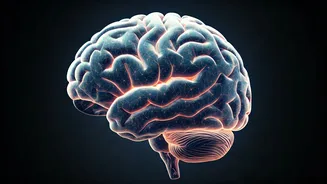Brain's Transformation
Tai Chi's effect on the brain is quite significant. After just eight weeks of consistent practice, noticeable changes begin to occur. Neuroimaging studies
reveal increases in brain volume in areas associated with memory and executive function. These areas, including the hippocampus and frontal lobe, become more active and efficient. The practice of slow, mindful movements, along with deep breathing, reduces stress hormones like cortisol, which often impair cognitive function. The calming effect facilitates improved blood flow to the brain, which enhances the delivery of oxygen and essential nutrients. This increased blood flow helps to improve cognitive performance and overall brain health. Additionally, Tai Chi can stimulate the growth of new brain cells, contributing to enhanced cognitive abilities. Regular Tai Chi promotes neuroplasticity, which is the brain's capacity to reorganize itself by forming new neural connections throughout life, promoting better cognitive flexibility.
Improved Function, Memory
One of the most immediate benefits of regular Tai Chi practice is a noticeable improvement in cognitive function. Participants in studies often report heightened focus, better concentration, and enhanced mental clarity. Memory also receives a substantial boost. Studies have shown improvements in both short-term and long-term memory functions after a few weeks of consistent Tai Chi practice. The practice's focus on mindfulness and body awareness also helps in improved attention and processing speed. Tai Chi's rhythmic movements promote a state of relaxed alertness, reducing mental fatigue and increasing the brain's ability to retain information. This combination of improved cognitive function and memory makes Tai Chi an effective tool for maintaining mental sharpness and for dealing with age-related cognitive decline. Its gentle nature makes it accessible to people of all ages and fitness levels, allowing anyone to experience its cognitive benefits.
Why Tai Chi Works
Tai Chi's effectiveness stems from a combination of physical, mental, and spiritual components. The gentle, flowing movements involve a deep connection between the mind and body, requiring constant focus and mindful awareness. This coordination helps to train the brain's executive functions, like attention and decision-making. The slow, deliberate movements reduce stress and promote relaxation, which directly benefits the brain's health. The practice integrates breathing exercises that increase oxygen intake and improve blood circulation. Moreover, Tai Chi's holistic nature has been shown to reduce symptoms of anxiety and depression, both of which affect cognitive function. The repetitive, graceful motions and deep breathing exercises quiet the mind and improve overall mental well-being, paving the way for improved cognitive performance. It is a form of exercise that nurtures the whole person and yields a multitude of benefits.
Long-Term Promises
The cognitive benefits of Tai Chi extend far beyond immediate improvements. Consistent practice can provide long-term protection against cognitive decline and neurodegenerative diseases. Tai Chi enhances neuroplasticity and the brain's resilience. The brain's ability to maintain its cognitive function is supported by improvements in neural connections and cognitive reserves. Studies reveal that regular Tai Chi practice is associated with a lower risk of dementia and Alzheimer's disease. The practice helps maintain the structural integrity of the brain and improves overall brain health. Its capacity to reduce stress and improve sleep quality plays a crucial role in safeguarding cognitive health over time. In essence, Tai Chi is a sustainable strategy to maintain mental sharpness and promote healthy aging. Regular and consistent engagement in Tai Chi can help pave the way for a more active, and mentally vigorous life.





















